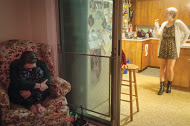By Valerie McMurray – [email protected] – Staff Writer

Photo Illustration by Will Breedlove – Photography Co-Editoron
Although middle-aged and elderly populations are more likely to die by suicide than people between the ages of 15-24, suicide is one of the top 10 causes of death for Americans, according to recent figures from the Centers for Disease and Prevention.
“Suicide is almost always a mystery. No one can say what the deceased’s state of mind was,” said Barton Evans, a clinical psychologist. “It’s a great tragedy, a vulnerable time that always brings up a lot of questions.”
While males are four times more likely than females to die by suicide, females attempt suicide three times as often as males. The rates of suicide attempts among LGBTQ youth rank higher than rates among youth in the general population. Depression and mood disorders are among the most common mental health issues to increase the likelihood of suicide, according to statistics from the CDC.
“It’s hard to predict, even if you know what the warning signs might be, what will cause someone to cross that line,” said Amy Morgan, a licensed therapist based in Woodfin.
Keeping pain a secret is often a contributor to eventual suicide, Evans said. There are often feelings of hopelessness anything can change in the future, although the problem itself is almost always a temporary state.
Depression is an external symptom of inner feelings of hopelessness and worthlessness, according to Judy Maris, an Asheville-based licensed counselor.
Morgan said suicide is an attempt to seek relief. It’s “any way out.”
Some might say suicide is “selfish,” but those who are suffering don’t see it that way, Morgan said. Shame and fear of ridicule often cause people to isolate themselves when they are in pain, precisely when they need to be reaching out for help.
“Depression is an enormously painful state. It’s a hard state to get out of on your own,” Evans said.
“Exposing yourself as vulnerable is like bleeding into the water when you’re surrounded by sharks. Be proactive in starting conversations about your pain,” Maris said. “The healing possibility is not removed. It’s possible to heal from trauma and from a crappy childhood.”
Maris said people may suffer from depression and not recognize it.
“I think a lot of people walk around with this voice inside their head, criticizing themselves, and a lot of them aren’t aware of it,” Maris said. “It may come from childhood, where children may develop it before they even learn how to talk, from parents who were anxious about their range of expressions. Healing comes from disempowering the self-punitive voice and its lies. Meditation can help the chattering monkey.”
Childhood is a time for developing resilience, or else fragility, Maris said. Culture may create a division along gender lines that prohibits natural emotional expression.
“Girls are taught not to express anger. Guys are not supposed to feel sad, lonely, scared, but of course, they do,” Maris said. “It’s taboo.”
“Our culture is relentlessly externally focused,” Maris said. “There’s less and less acknowledgement of inner life.”
Some people deny their depression in all honesty and find it to be an unnameable state, according to Maris.
“If you grew up in a household that never talked about feelings, you don’t necessarily know your own feelings,” Maris said. “Therapy can help people reconnect with their natural adaptive feelings.”
Behavioral therapy can address the roots of pain, like skewed thinking, distortion and trauma, and help develop coping skills, according to Morgan, who said one of the most helpful aspects of therapy is the trust relationship between patient and therapist, who can simply with sit them while they’re experiencing the pain.
Currently there is a gap in local suicide crisis resources. Listening Hearts Crisis Center, a nonprofit organization aimed at intervention, closed last year due to lack of funding.
Evans, who helped institute successful suicide prevention programs at Georgetown University and UNC Greensboro, said they were able to “pick up people who might have otherwise slipped through the cracks” by doing outreach with student life programs, instituting an emergency helpline, out how to make contact and simply “being very available.”

















